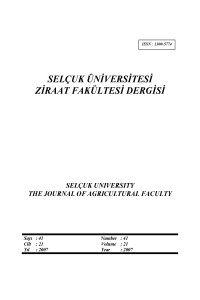Abstract
In this research it was aimed to improve different methods apart from manual harvesting requires intensive labour in dry bean harvesting. For this purpose three different methods were used for bean harvesting-threshing and these methods were tested in fields where two different local bean population (Canada-Sarikiz) were cultivated.
I. Method: Hand pulling, piling, threshing by thresher.
II. Method: Cutting by double knife mower, piling, threshing by thresher.
III. Method: Harvesting-threshing by prototype harvesting-threshing machine.
Labour requirements and energy consumptions were determined in these methods.
Consequently, it was found that consumed energy in Canada and Sarikiz bean population were 2121.81 MJ.ha-1-1866.41 MJ.ha-1 in the first method, 1087.73 MJ.ha-1-1050.25 MJ.ha-1 in the second method, 873.76 MJ.ha-1 -868.33 MJ.ha-1 in the third method, respectively.
Abstract
Bu araştırmada, kuru fasulye hasadında, yoğun işgücü gerektiren elle hasat dışındaki farklı yöntemlerin geliştirilmesi amaçlanmıştır. Bu amaçla, fasulye hasat-harmanı için üç farklı yöntem kullanılmış ve bu yöntemler iki farklı yerel fasulye popülasyonunun (Kanada ve Sarıkız) yetiştirildiği tarlalarda denenmiştir.
I. Yöntem: Elle yolma, öbek yapma, harman makinası ile harmanlama.
II. Yöntem: Çift bıçaklı çayır biçme makinası ile biçme, öbek yapma, harman makinası ile harmanlama.
III. Yöntem: Prototip hasat-harman makinası ile hasat ve harmanlama.
Bu yöntemlerdeki işgücü ve enerji tüketimleri belirlenmiştir.
Sonuç olarak, Kanada ve Sarıkız fasulye popülasyonlarında sırasıyla I.Yöntemde toplam tüketilen enerji 2121.81 MJ/ha ve 1866.41 MJ/ha bulunmuştur. II. Yöntemde bu değerler sırasıyla 1087.73 MJ/ha ve 1050.25 MJ/ha’dır. III. Yöntemde ise 873.76 MJ/ha ve 868.33 MJ/ha olarak bulunmuştur.
Details
| Primary Language | English |
|---|---|
| Subjects | Agricultural Engineering |
| Journal Section | Research Article |
| Authors | |
| Publication Date | April 25, 2007 |
| Submission Date | January 1, 2007 |
| Published in Issue | Year 2007 Volume: 21 Issue: 41 |
Selcuk Agricultural and Food Sciences is licensed under a Creative Commons Attribution-NonCommercial 4.0 International License (CC BY NC).


